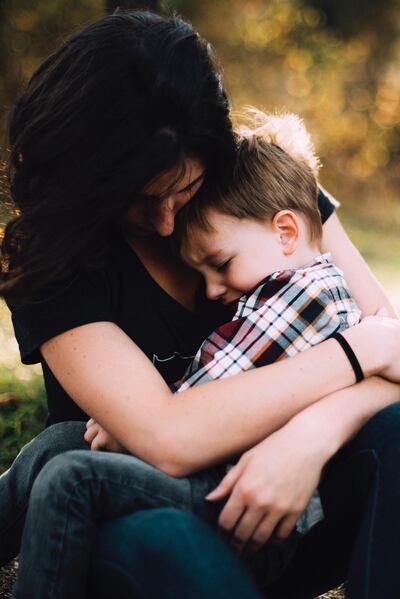As cities around the world begin to reopen, after shutting down for the past few months because of the coronavirus pandemic, life for many of us is likely to be quite different from what it was before.
For some people, this is welcome, but for others, the fear of the unknown is hard to ignore.
"In uncertainty, such as our current experience with Covid-19, it's typical for people to have worries about their families, children, financial security and so on," says Bene Katabua, an educational psychologist at Kids First Medical Centre in Dubai. "It can be difficult to feel secure when we can't predict the outcome. In such moments, we might find that we worry more about details than we previously would have."

Dr Marta Ra of Paracelsus Recovery in Switzerland says it's important to be able to distinguish between fear and anxiety. "Fear is a reaction to a specific, tangible danger, whereas anxiety is a feeling of apprehension about what's to come. For instance, we can feel fear when we are in public spaces because the coronavirus could be in those environments.
"In contrast, we might feel anxious about what the future holds, our careers, finances, or the health of our loved ones."
While feelings of stress and anxiety are to be expected during a global crisis, prolonged experiences of negative emotions may signal a deeper problem.
So how can someone tell if what they're feeling is normal or if there might be a more serious matter to address?
How to tell when something is wrong
One of the first tell-tale signs of a deeper problem is if the negative feelings persist, or continually get worse.
"One of most notable physical changes is sleep disturbance," Ra explains. "A downward spiral can follow, because while anxiety can negatively impact our sleep, exhaustion will also increase anxiety.
"Other symptoms [to look out for] include stomach cramps, nausea, vomiting, gastrointestinal issues and panic attacks."
High levels of stress and anxiety can begin to manifest in physical ways. Katabua adds it's "incredibly helpful" to just listen to what your body is trying to tell you and be prepared to slow down or take a step back. She cites shortness of breath and having a persistent upset stomach as other symptoms to look out for.
Suddenly being afraid to go out or stopping normal activity can be worrisome, too.
"For example, instead of feeling fear at the supermarket, you might suddenly feel too afraid to leave your house," Ra warns. "More still, if your worries prevent you from completing daily tasks, you experience unusual, stressful or alarming thoughts, and suffer from intense physical reactions, you may have an anxiety disorder."

How to help yourself feel better
There are a number of ways to ease temporary negative emotions. This includes drawing boundaries when it comes to things that might play upon anxiety or stress. For instance, turning away from social media or limiting the amount of news being consumed.
"It's good to stay up to date with current affairs, but if this is heightening your levels of anxiety, it would be helpful to step back from time to time," says Katabua.
"It's also advised to make sure you're connected to your community. Reach out to loved ones who can help you feel more centred and stable."
Just as with any stressful situation, self-care is important and activities such as exercise and mindfulness can play a big role in helping you to feel better, both physically and mentally.
"To navigate anxiety, we need to manage our stress levels. Stress-management methods such as adequate sleep hygiene, laughter, exercise, yoga, limited caffeine and a healthy diet will ease your symptoms," says Ra.
She adds that focusing on your mindset and knowing when negative thoughts are about to strike are important, too, and that people shouldn't be afraid to reach out if they're having a difficult time.
"To navigate these negative thought patterns, try to take it one day at a time, focusing on the day ahead, not the week, month or year. Further, reach out for support from a loved one, a professional, or someone you trust."
If you find your symptoms are severe and prolonged, as described above, however, then it is advised you seek help from a professional therapist as soon as possible.
What to do when a child is upset
Adults aren't the only ones who might be finding it difficult to cope, as children and young people are also trying to navigate this strange, and often uncomfortable, situation.
"We recommend for parents to monitor their child's behaviour," says Dr Amy Bailey, a clinical psychologist at Kids First Medical Centre in Dubai. "If there are changes to their usual way of being, then this may be a cause for concern."

Examples would include differences in a child's usual eating or sleeping habits, regression in behaviour, less enjoyment in things they previously liked, displaying withdrawn or clingy behaviour, or if there is an increase in emotional outbursts.
If children show these signs, there are things parents can do to help make them feel better, such as creating a routine or trying mindfulness techniques.
"Having structure and routines can help children, as it creates predictability for them, therefore it is important to try to maintain that as much as possible, but also with some flexibility," says Bailey.
"You can try to practise things like mindfulness. This might be something you and your child can do together to help you both feel more relaxed. Model how to deal with difficult feelings, so if you yourself are experiencing difficult feelings you can say: 'You know, I am finding this really scary, but I am going to do my best to cope with it.'"
Also, it's important to talk to them to help them better understand what is happening, and to help alleviate their fears.

"It is essential to understand that you cannot eradicate your child's anxiety – but you can help them manage it," says Ra. "Try to remind your child that it is okay to feel upset right now, and this feeling, like all feelings, will pass.
"Ask them about their emotions, if they have any Covid-19-related questions, and remember that you do not need to have all the answers. However, approaching your child's concerns with empathy and your undivided attention will help them feel safe."








